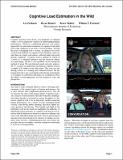Cognitive Load Estimation in the Wild
Author(s)
Fridman, Lex; Reimer, Bryan; Mehler, Bruce L.; Freeman, William T
DownloadAccepted version (3.109Mb)
Terms of use
Metadata
Show full item recordAbstract
Cognitive load has been shown, over hundreds of validated studies, to be an important variable for understanding human performance. However, establishing practical, non-contact approaches for automated estimation of cognitive load under real-world conditions is far from a solved problem. Toward the goal of designing such a system, we propose two novel vision-based methods for cognitive load estimation, and evaluate them on a large-scale dataset collected under real-world driving conditions. Cognitive load is defined by which of 3 levels of a validated reference task the observed subject was performing. On this 3-class problem, our best proposed method of using 3D convolutional neural networks achieves 86.1% accuracy at predicting task-induced cognitive load in a sample of 92 subjects from video alone. This work uses the driving context as a training and evaluation dataset, but the trained network is not constrained to the driving environment as it requires no calibration and makes no assumptions about the subject's visual appearance, activity, head pose, scale, and perspective.
Date issued
2018-04Department
Massachusetts Institute of Technology. Department of Aeronautics and Astronautics; Massachusetts Institute of Technology. Center for Transportation & Logistics; Massachusetts Institute of Technology. Department of Electrical Engineering and Computer SciencePublisher
Association for Computing Machinery (ACM)
Citation
Fridman, Lex et al. "Cognitive Load Estimation in the Wild." Proceedings of the 2018 CHI Conference on Human Factors in Computing Systems, April 2018, Montreal, Canada, Association for Computing Machinery, April 2018. © 2018 Association for Computing Machinery
Version: Author's final manuscript
ISBN
9781450356206